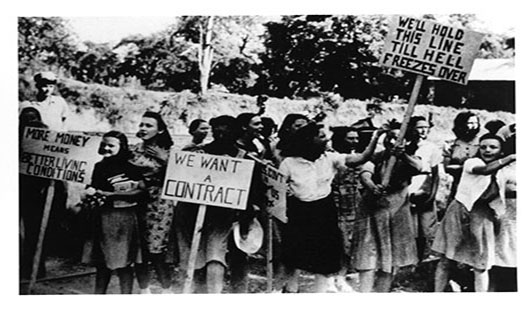
Sunday, May 1, 4-6:30pm
The public is invited to this free program on Zoom. Registration required.
Click HERE to register.
Join us on Sunday to mark May Day, an international holiday celebrating working people (except in the USA, where President Dwight Eisenhower established it as “Law Day” to celebrate the Rule of Law in a Free Society.) We’ll screen the documentary The Uprising of ’34, about one of the largest labor strikes in American history, with the epicenter in South Carolina. Seven strikers were murdered, and many more were wounded at a textile mill in Honea Path, leaving a lasting chill on union organizing. The film about this suppressed history premiered on PBS, showing in every state except South Carolina.
After the film, Dr. Michelle Haberland, a professor at Georgia Southern with a focus on Southern working-class history, will discuss the history and current state of organized labor. Haberland is the author of Striking Beauties: Women Apparel Workers in the United States South, 1930 – 2000.
Michelle Haberland is Professor of History at Georgia Southern University. She received her Ph.D. from Tulane University where she began working on Striking Beauties: Women Apparel Workers in the United States South, 1930 – 2000, the first book-length study of the southern apparel industry and its workers. Published in 2015 by the University of Georgia Press, Striking Beauties was awarded the H. L. Mitchell Award by the Southern Historical Association for the best book published in the preceding two years concerning the history of the southern working class. At Georgia Southern, Michelle directed the Women’s and Gender Studies program from 2012 to 2015. Since 2015, Michelle has served on the Women’s Gender and Sexuality Studies Executive Board. In the History Department, Michelle leads courses on a variety of subjects, including Working-Class History, The United States in the 1960s, The New South, and Oral History. She also served as the Executive Secretary for the Southern Association for Women Historians and represented faculty at public universities on the Executive Council for the Georgia Conference of the American Association of University Professors.
